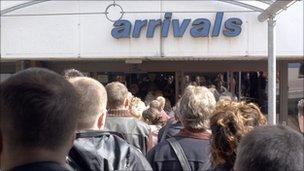Jack Straw regrets opening door to Eastern Europe migrants
- Published

Unlike France and Germany, the UK did not put any restrictions in place on the right to work
Having no restrictions on eastern European migrants in 2004 was a "spectacular mistake", former Labour home secretary Jack Straw has said.
The Labour MP said handing immediate working rights to Poles and others when they joined the EU nine years ago was a "well-intentioned policy we messed up".
Labour relied on research suggesting 13,000 migrants a year would arrive.
But the influx was much larger than expected and contributed to net migration rising above 200,000 a year.
Unlike France and Germany, which did not give migrants from the ten countries which joined the EU in May 2004 full access to their labour market until 2011, the then Labour government did not insist on any transitional controls.
'Red faced'
Writing in the Lancashire Telegraph, external, Mr Straw, who is standing down as an MP at the next general election in 2015, said the policy was based on predictions about future trends which turned out to be wrong.
"One spectacular mistake in which I participated (not alone) was in lifting the transitional restrictions on the eastern European states like Poland and Hungary which joined the EU in mid-2004," he said.
"Other existing EU members, notably France and Germany, decided to stick to the general rule which prevented migrants from these new states from working until 2011.
"But we thought that it would be good for Britain if these folk could come and work here from 2004.
"Thorough research by the Home Office suggested that the impact of this benevolence would in any event be 'relatively small, at between 5,000 and 13,000 immigrants per year up to 2010'.
"Events proved these forecasts worthless. Net migration reached close to a quarter of a million at its peak in 2010. Lots of red faces, mine included."
Mr Straw was foreign secretary at the time the decision was taken.
Earlier this year, the economist whose research provided the basis of the Home Office's calculations accused MPs of misinterpreting his figures.
Prof Christian Dustmann insisted he had made clear that immigration would be much higher if, as happened, Germany and other countries decided to curb access to their labour markets.
'Well-intentioned'
The UK Independence Party has long criticised Labour for failing to anticipate the number of people from eastern Europe who would seek work in the UK and its impact on opportunities for British workers.
The party has warned of similar problems when transitional controls on Bulgarian and Romanian workers - put in place when the two countries joined the EU in 2007 - expire at the end of the year.
Claims by UKIP that millions could flock to the UK have been attacked as scaremongering.
The Conservatives have pledged to reduce levels of net migration - the difference between the number of people leaving the UK and those settling here - from more than 250,000 in 2010 to less than 100,000 by 2015.
But the latest figures, external showed an increase to 176,000 in the year to September 2012.
Amid concerns about so-called benefit tourism, Mr Straw, the MP for Blackburn, pointed to recent research indicating that the immigrants from 2004 were less likely to claim benefits than UK natives.
"I have never under-estimated the social dislocation that can occur when large numbers of people from abroad settle in a particular area - as has happened in east Lancashire," he added.
"But this latest research makes me feel a little better about this well-intentioned policy we messed up."
Roma community
Meanwhile, Mr Straw's successor at the Home Office, David Blunkett, has said he is concerned tensions between local people in Sheffield and Roma migrants could lead to riots, unless more action is taken to improve integration.
Mr Blunkett told the BBC Radio Sheffield that Roma groups from Slovakia who had settled in a district of the city were behaving like they were living in a "downtrodden village or woodland".
"Many of them don't even live in areas where there are toilets or refuse collection facilities," he said.
The incomers had to "adhere to our standards and to our way of behaving" and, if they did so, would be welcomed, Mr Blunkett argued.
He added: "We have got to change the behaviour and the culture of the incoming community, the Roma community, because there's going to be an explosion otherwise. We all know that."
But he also stressed the need for members of the local community, who were venting their anger on Twitter or in "vigilante" groups, to get involved in efforts to improve integration.
- Published7 March 2013
- Published1 May 2011
- Published23 April 2013